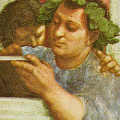335. Sabrina Ebbersmeyer on Emotions in Renaissance Philosophy
An interview with Sabrina Ebbersmeyer about the relation of emotion to reason and the body, and panpsychism, in the Renaissance.
Themes:
• S. Ebbersmeyer, Sinnlichkeit und Vernunft. Studien zur Rezeption und Transformation der Liebestheorie Platons in der Renaissance (Munich: 2002).
• S. Ebbersmeyer and E. Keßler (eds), Ethik – Wissenschaft oder Lebenskunst? Modelle der Normenbegründung von der Antike bis zur Frühen Neuzeit (Münster: 2007).
• S. Ebbersmeyer, Homo agens: Studien zur Genese und Struktur frühhumanistischer Moralphilosophie (Berlin: 2010).
• S. Ebbersmeyer, “The Philosopher as a Lover : Renaissance Debates on Platonic Eros,” in L. Shapiro and M. Pickavé (eds), Emotions and Cognitive Life in Medieval and Early Modern Philosophy (Oxford: 2012), 133-55.
• S. Ebbersmeyer (ed.), Emotional Minds : The Passions and the Limits of Pure Inquiry in Early Modern Philosophy (Berlin: 2012).
• S. Ebbersmeyer and D.N. Lines (eds), Rethinking Virtue, Reforming Society : New Directions in Renaissance Ethics, c. 1350-1650 (Turnhout: 2013).
• S. Ebbersmeyer, “Do Humans Feel Differently? Telesio on the Affective Nature of Men and Animals,” in C. Muratori (ed.), The Animal Soul and the Human Mind: Renaissance Debates (Pisa: 2013), 97-111.
• S. Ebbersmeyer, “Renaissance Theories of the Passions : Embodied Minds,” in S. Schmid (ed.), Philosophy of Mind in the Late Middle Ages and Renaissance (London: 2018), 185-206.







Comments
Term Emotions Feelings
It is very interesting to hear, how terms like emotions, feelings, sensations etc. have been defined in the rennaissance. I learned last year, that the word 'Gefühl' is rather new. It would be interesting to hear an extra episode about the developements/changes of all the terms related to emotions much later in the HOP throughout history. e.g. in the 18th century or later. (Actually that kind of podcasts would be very interessting for all sorts of philosophic terms and definitions. )
Thank you for this intervew.
Add new comment